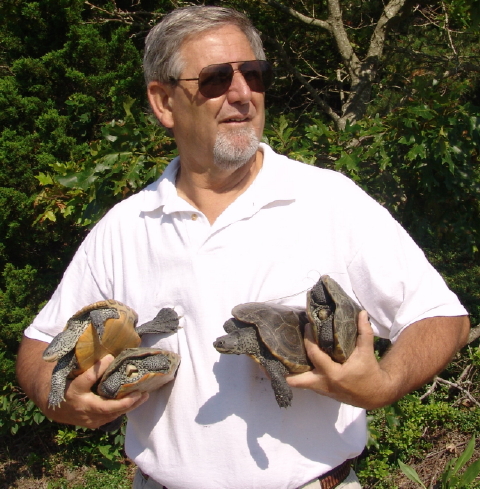The Standard-Times (SouthCoastToday.Com)
(Click Line Above for PDF of Front Page)
New Bedford, MA, September 23rd, 2010
Q&A with executive director
of the Massachusetts Association of Conservation Districts
“The Turtle Guy” Don Lewis says
we can learn a lot by studying turtles.
IN PERSON: Don Lewis, “The Turtle Guy”
(Click Line Above for Hyperlink to Standard-Times Article)
Chatting with “The Turtle Guy,” Don Lewis
Marion resident Don Lewis — also known as “The Turtle Guy” — first became interested in wildlife when he was asked to research endangered marine turtles. He is the executive director of the Massachusetts Association of Conservation Districts, responsible for protecting and conserving all the natural resources within the 14 Massachusetts conservation districts.
Q: How did you become known as “The Turtle Guy?”
A: Well, maybe because I’m cold blooded, what do you think? (Laughs.) I started working on marine turtles and spending all of my time, 24/7, researching turtles and doing conservation of turtles … After a decade of doing that, people start thinking of you as the turtle guy.
Q: Why did you decide to focus on turtles, in other words, why are you fascinated with turtles?
A: Well, when you’re an old retired guy or a young retired guy, you want to find species to research that you have a reasonable chance of catching. The real answer is that turtles are a bellwether species … for all of the habitats that they occupy. If you study turtles and you find out that their populations are in decline, then you know that there’s something wrong with the habitat … Turtles are located on the six habitable continents. You can find them in the habitats from the deep blue sea, to the deserts. By studying them you get to learn about the health of the habitats they live in, and that’s why turtles are so cool. So, if you’re studying the sea turtles, you’re learning about the health of the ocean … When you’re studying the eastern box turtle, for instance, you learn about the health of our neighborhoods.
Q: If you had to describe your work with one word, what would it be and why?
A: The word is discovery because every day that I’m involved with wildlife is a day that I learn something new. Every day I’m out studying wildlife, not only do I learn something, but I learn something that I can apply to save the environment.
Q: What can turtle lovers do to protect their turtles? How should people take care of them?
A: Turtles belong in the wild, and the best thing that we can do is to keep turtles in the wild and protect their habitats. That’s why every time I am given a turtle to rescue; my primary goal is to get it back into the wild, where it can preserve the wild populations. Some of (the) things we can do (are) if we see a turtle in distress, we can call the turtle guy, and if we see a turtle crossing the road … we always try to help it across in the direction that it’s heading in. The most important thing we can do for turtles is to preserve their habitat.
Q: Do you think that someday turtles may disappear from the planet?
A: Turtles have been around for 300 million years. They survived the dinosaurs. They survived the asteroid that killed the dinosaurs. They survived the glaciers. They survived global warming and if I had to put my money on them, I’d say they’re going to survive us. I think the chances are a lot better for turtles than they are for humans, and humans can learn a lot by studying turtles.
=================================================
Lewis has been conducting research projects on endangered wildlife for twelve years. His favorite turtle is the Diamondback Terrapin because it is the bellwether species for our coast. What he loves the most about turtles is their persistence. For more information, call Lewis at 508-274-5108, e-mail him at theturtleguy@comcast.net, or visit http://www.turtlejournal.com/.
